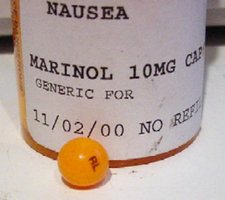SAN FRANCISCO -- New modes of delivering medicinal cannabis may soon provide alternatives to smoked marijuana and Marinol.
The difficulty of titrating oral Marinol (dronabinol), a prescription drug, and the problems of psychoactive and harmful effects from smoked marijuana have spawned efforts to develop inhalers, sublingual drops and sprays, skin patches, and parenteral delivery.
A sublingual cannabis extract containing tetrahydrocannabinol (THC) and cannabidiol was easily titrated, well tolerated, and effective for chronic pain in a double-blind pilot study of six patients, Dr. William Notcutt said at a conference on cannabis therapy sponsored by the University of California, San Francisco.
Four patients had multiple sclerosis, one had chronic back pain, and one had post--spinal surgery pain in the back and legs. All had smoked marijuana previously for pain relief, said Dr. Notcutt, of the University of East Anglia, Norwich, England.
The spray was made by GW Pharmaceuticals, Salisbury, England, which the British government authorized in 1997 to cultivate and distribute cannabis for medical research. The company blends extracts from a warehouse full of cloned marijuana plants to test formulations of cannabinoids.
"If we can get rid of the psychoactive effects, randomized controlled trials are doable," company chairman Geoffrey W Guy said. Other clinical trials should start in Canada and possibly in the United States later this year, he added.
Also, the American Cancer Society has awarded a 3-year, $361 ,000 grant to researchers at the Albany (N.Y.) College of Pharmacy to develop a marijuana skin patch to control chemotherapy-related nausea and vomiting. Marinol and other oral drugs are approved for this indication, but vomiting can preclude their effectiveness.
The Food and Drug Administration approved an application to begin clinical trials of CT-3. This synthetic derivative of THC is intended for use as an analgesic and anti-inflammatory drug and has no psychoactive effect. Atlantic Technology Ventures Inc., New York, has a phase-I trial using oral and parenteral formulations underway in France.
COPYRIGHT 2000 International Medical News Group
COPYRIGHT 2001 Gale Group



